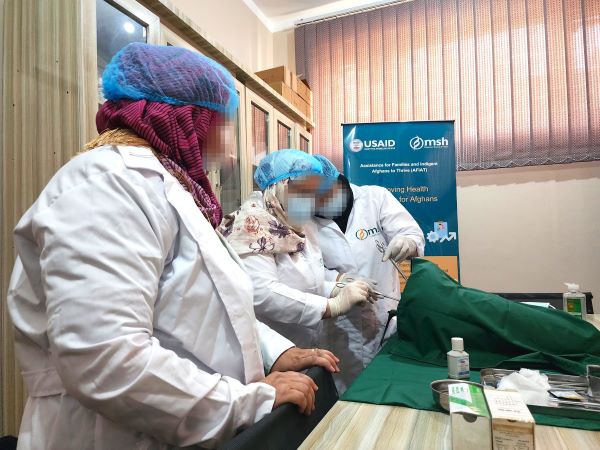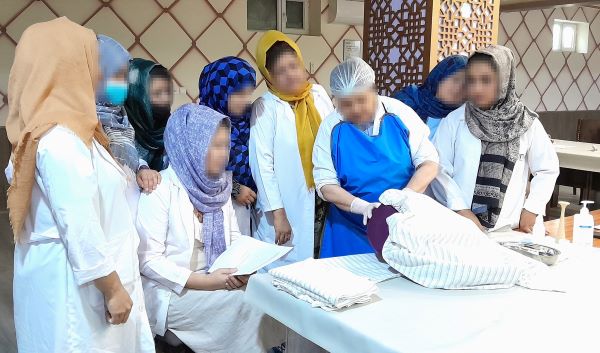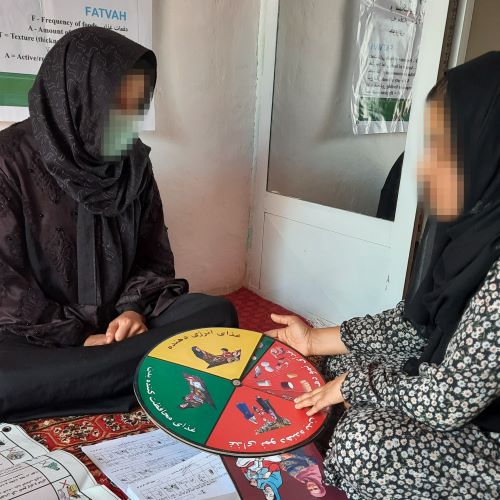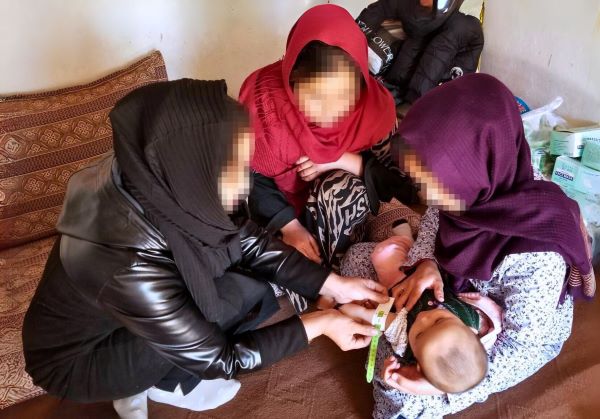Putting Systems Thinking into Practice in Afghanistan
Putting Systems Thinking into Practice in Afghanistan

While Afghanistan’s health system has seen steady improvements over the last two decades, a complex set of interconnected challenges—including resource constraints, geographical disparities, and limited infrastructure—presents persistent barriers that impede the delivery of universal health care services, especially in remote or otherwise underserved areas. To navigate these challenges, a systems thinking approach is crucial. Through the USAID-funded Assistance for Families and Indigent Afghans to Thrive (AFIAT) project, Management Sciences for Health (MSH) puts systems thinking into practice through a participatory, evidence-based approach that increases access to high-quality health and nutrition services, bolsters supply chain management, optimizes resources, and builds partnerships to foster a resilient health system that is responsive to the diverse needs of its people.
A key component of AFIAT’s work is delivering targeted, comprehensive training and ongoing mentorship to health facility managers and service providers, from community-based volunteers to facility-based health workers, including midwives and nutrition counselors. By enabling managers to identify gaps and develop customized training plans to strengthen service delivery, AFIAT makes foundational changes in support of the whole health system that increase access to and coverage, quality, and efficiency of health services, leading to better health outcomes for patients like Saliha.*
Saving Lives through Systems Thinking: Saliha’s Story
Operating at the grassroots level of Afghanistan’s health system, community health workers (CHWs) often serve as the first point of contact for people in need of primary health care. In a complex context where many people face geographical, financial, and societal barriers to care, CHWs are an essential partner in expanding access to health services. That’s why AFIAT trains and mentors CHWs, like siblings Najla* and Halim* from Parwan Province, to equip them with the knowledge and skills they need to bring quality care to underserved populations in their communities.

“Someone from AFIAT visits our home twice a month to provide ongoing training and mentorship to me and my sister,” says Halim, explaining that they have a room in their house allocated to serve as their community’s health post. “These lessons have been highly effective and useful for us because they cover all the necessary health topics—tuberculosis, nutrition, danger signs during pregnancy, patient referrals, and community health education, for example—to help address needs that we see in our community.”
CHWs are especially critical in promoting women’s health in rural areas of Afghanistan. “Here, women face more limitations to receive quality care—and that’s where female CHWs like me play a critical role,” explains Najla. “Women also often feel like they cannot share or discuss their health concerns with others, so I’m there to listen to and support them, and take them to health facilities when their conditions require it.”
Halim shares her sentiment. “The role of female CHWs is exceptionally important to help women access the right guidance and care, but they face the same challenges that all women face,” Halim says. “Female CHWs are working in a complicated situation, too, so I’m always there to assist my sister when there’s a critical issue. We make a good team.”
“The role of female CHWs is exceptionally important to help women access the right guidance and care, but they face the same challenges that all women face. Female CHWs are working in a complicated situation.”
Halim, a community health worker (CHW) in Afghanistan
The siblings recall one home visit during which they each leveraged their own strengths to ensure a young expectant mother named Saliha received the care she needed. During the initial screening, Najla employed the skills she learned through her AFIAT mentorship to assess Saliha, who was visibly weak. Najla found that she had a mid-upper arm circumference of just 21 centimeters, suggesting moderate malnutrition. “I recommended that Saliha visit the clinic for a medical examination,” Najla says, “but she was hesitant to go with me.” Eventually, Saliha revealed to Najla that she did not think her husband would permit her to visit the clinic.
Understanding that the situation was delicate, Najla enlisted her brother to help explain the severity of Saliha’s condition to her husband. “I addressed his questions and concerns and explained why it was important that his wife go with my sister to the health facility,” Halim recalls. “Once I told him that these warning signs could threaten the lives of his wife and their baby, he agreed to let her accompany Najla to the health facility to see the midwife.”

Upon arrival at the clinic, Saliha was met by Rahima,* who has been serving her community as a midwife for 20 years. “My role at the health facility includes receiving and managing the paperwork for all the referrals from CHWs. That is how Saliha came under my care.” Like Najla and Halim, Rahima has also received ongoing training and mentorship from AFIAT on a wide range of integrated health topics. “My clinic is part of [the project], so my colleagues and I have the privilege of participating in mentorship learning sessions,” she says.
“I noticed right away that something was very wrong,” Rahima says, noting that she observed the same warning signs that Najla noticed during their home visit. “Through AFIAT, I had learned about the risks that malnutrition poses to the health of pregnant women and their babies, so I immediately referred her to a nutrition counselor so she could be enrolled in the Therapeutic Supplementary Feeding Program.”
From then on, Saliha began receiving nutritional supplements designed to provide undernourished pregnant and breastfeeding women with more calories, protein, and vitamins. During subsequent visits to the clinic, Saliha’s progress was notable; she was slowly but steadily gaining weight, and her energy levels were much better. She also expressed excitement to come back to the clinic to deliver her baby, with her husband’s enthusiastic support.
Addressing Systemic Challenges, Making Individual Impact
Saliha’s story exemplifies how strengthening health systems from the ground up saves lives, underscoring the tremendous impact that MSH’s systems thinking approach has at the individual level. “By taking this systems thinking approach, we address the key systemic challenges facing health workers and the patients and communities they serve, contributing significantly to increased access to health services and medical commodities in these rural areas,” says Dr. Khalid Rahim, MSH’s Afghanistan Portfolio Director. “All together, these initiatives will have a powerful impact on reducing the maternal mortality rate and on overall population health. AFIAT continues to adapt and grow so that we can continue to help pave the way for a healthier future for women and children in Afghanistan.”
Since the launch of AFIAT in 2020, approximately 800 midwives like Rahima have received training and ongoing mentorship from the program. “The integrated training helped me effectively assess and refer Saliha to receive the supplemental nutritional support she needed to save her and her baby,” notes Rahima. “It’s gratifying to have the opportunity through AFIAT to continually improve and expand my knowledge so I can serve my patients in the best way possible.”

For Najla, the mentorship from AFIAT has not only expanded her skills to help her better serve her community but also reinvigorated her passion for pursuing a career in health care. “I had to pause my studies due to some interruptions outside of my control, so this ongoing training has been a special opportunity for me to increase my competence in these areas,” she says. “I hope to continue my education someday to become a doctor and provide health services to my cherished community, especially women like Saliha.” To date, AFIAT has provided training and mentorship to more than 2,400 CHWs—including about 1,270 women—to bolster access to health services at the community level.
“By targeting the entire health system, this work is dramatically impacting the lives and health of people and communities,” says MSH’s Vice President for Global Health Systems Innovation Dr. Dan Schwartz, who in November 2023 had the opportunity to visit Afghanistan and observe the impact of these integrated, holistic interventions firsthand. “Despite some immense operational challenges, our teams remain steadfast and engaged with our partners, ensuring not only that these training and mentorship sessions continue but also that laboratory capacities are strengthened, supply chains are managed, and the capacity of the Afghan health system continues to grow,” reflects Dr. Schwartz. “MSH has a long history of partnership in Afghanistan, and we are committed to continue delivering sustainable improvements in health outcomes for the Afghan people.”
*Names have been changed to protect privacy.